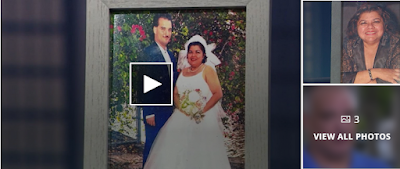by Danielle DaRos

Chris and Kim Gonsalves were married for almost 30 years. (WPEC)
FORT LAUDERDALE, Fla. (CBS12) — After
more than a year of I-Team reports, the issues in Florida’s guardianship
system are well-documented. It’s a program that’s supposed to help the
elderly and disabled manage their affairs, but we’ve shown you how, too
often, the professionals paid to protect their wards are taking
advantage of them.
Many of the families who have been featured in our I-Team reports have similar stories: they pursued guardianship for their loved ones because a lawyer told them it was the best way to safeguard their money. By the time they learn they’ve signed away all control, it’s too late.
For one family in South Florida, a guardianship meant a husband was no longer able to make end of life care decisions for his wife.
When we met Chris Gonsalves, he was outside a hospital in Broward county, in between visits with his wife, Kim.
“[The visits] are difficult,” he said. “As much as I try to be there for comfort, they are hard on me.”
For one family in South Florida, a guardianship meant a husband was no longer able to make end of life care decisions for his wife. (WPEC)Kim Gonsalves was suffering from pneumonia complications and placed
on a ventilator. There were a lot of tough decisions to be made: how
long should she receive treatment? Should she have a “Do Not
Resuscitate” order?
After nearly 30 years of marriage, Chris couldn’t make those decisions. That job went to a professional guardian: a stranger, appointed by a judge, paid out of Kim’s estate.
Chris didn’t realize pursuing a guardianship for his wife would turn out this way.
A few years ago, Kim suffered a ruptured brain aneurysm and collapsed. While recovering in a hospital, she was left unattended for several minutes, fell, lost oxygen to her brain, and suffered even more debilitating injuries.
A medical malpractice lawsuit awarded Kim $15 million dollars, Chris said, and provided a way to ensure her care and comfort in the years that followed.
“I was told by my attorneys that a guardian would be needed because of the trust in the amount of money,” Chris said. “That it was protection, the best choice.”
He filed a petition to be designated as her guardian, but what he didn’t know at the time was that a drug conviction from his past would disqualify him.
A judge appointed a professional guardian to make all of Kim’s health care and financial decisions.
From court filings, it’s clear Chris’ relationship with the guardian got tense.
The two disagreed about housing and issues like a DNR. Chris filed emergency orders to intervene in his wife’s behalf, and accused the guardian of over spending and unethical practices. The guardian’s attorney filed an order to have Chris removed as an interested party on the case and accused him of being after the money, writing his “gravy train” is over.
The two sides were at odds over a DNR when Chris spoke to the I-Team. Days later, he received an email from the guardian. “Kim passed,” the email said, writing that according to her nurse, Kim had gone into cardiac arrest.
A six sentence email: that’s how Chris found out the love of his life was gone.
As he prepares to bury his wife, Chris regrets pursuing a guardianship and wants other families to know the reality of these court appointed arrangements.
We wanted to know if there is anything you can do proactively to ensure you or your loved one is never placed in one.
Sancha Brennan, an attorney who specializes in estate planning and guardianship law, said there is no guarantee that guardianship is off the table — but there are ways to reduce your risk.
First, she said, people should plan ahead and consider legal documents that name a durable power of attorney and healthcare surrogate to make financial, personal and medical decisions in the event of incapacity.
“There are situations where those documents, if they are not maintained or updated regularly, they would not be affective to keep you from having a guardianship filed on your behalf,” Brennan explained.
Despite your directives, a judge can bypass them and appoint a professional guardian if he or she determines the appointee is unfit to serve.
The guardian in the Gonsalves case declined our request for an interview.
Full Article & Source:
I-Team: Families take legal advice, find themselves regretting guardianship

No comments:
Post a Comment